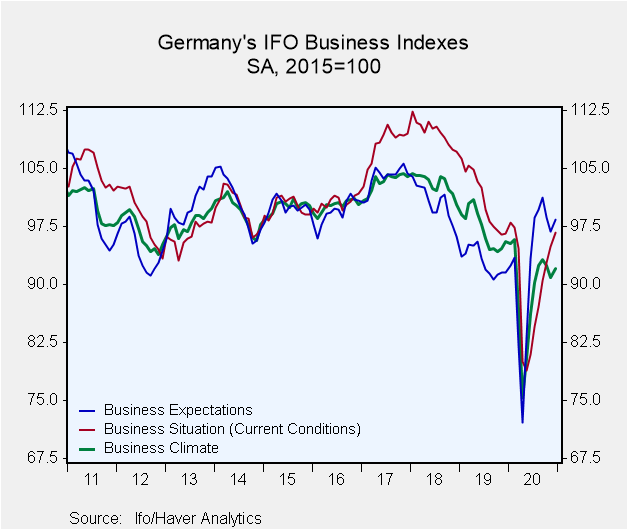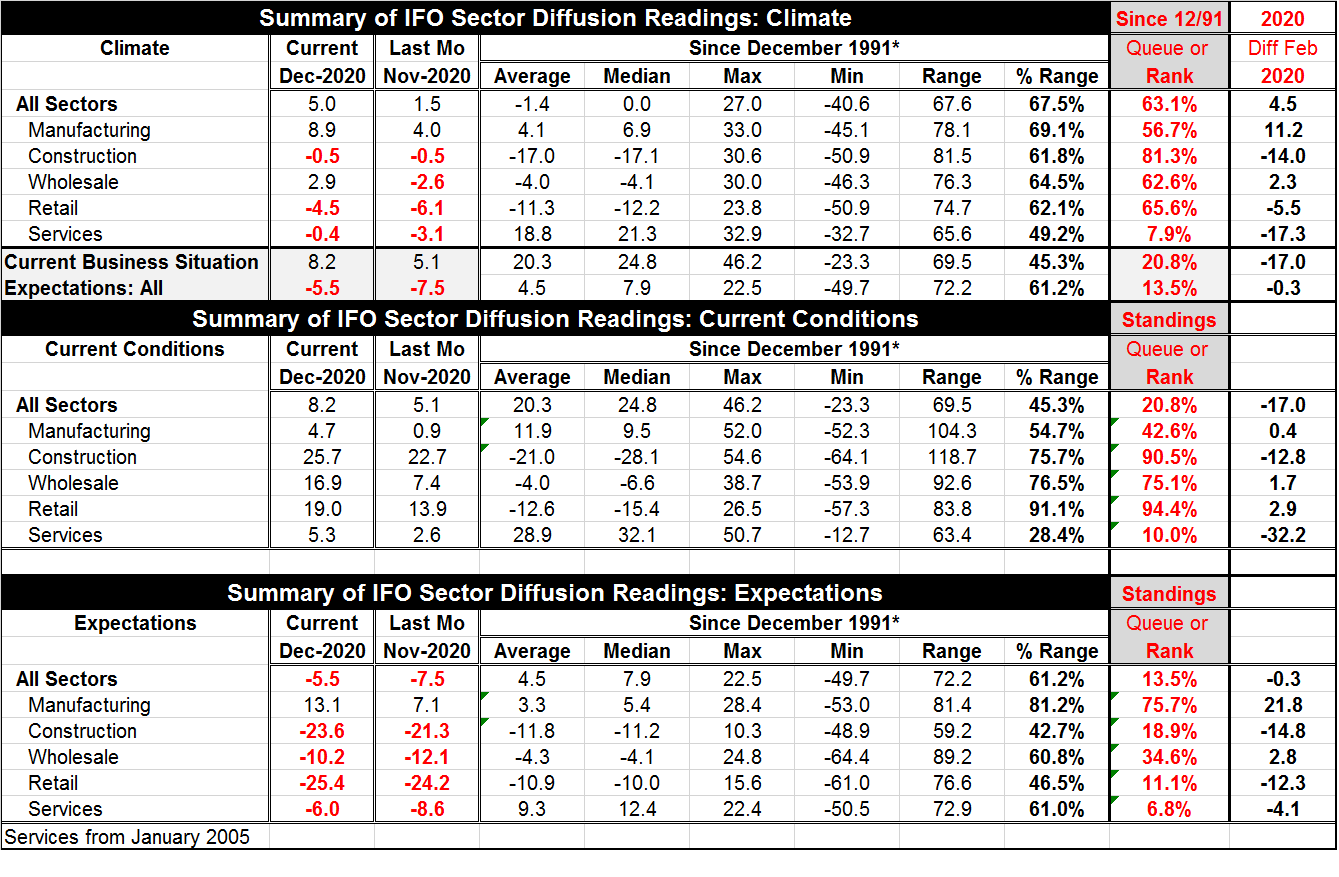 Global| Dec 18 2020
Global| Dec 18 2020IFO Surprisingly Improves...for Now
Summary
The IFO gauge of the German economy, a venerated report on the state of economic conditions in Germany, logged a surprising improvement in December. The climate gauge rose to +5.0 in December from +1.5 in November. The current [...]
 The IFO gauge of the German economy, a venerated report on the state of economic conditions in Germany, logged a surprising improvement in December. The climate gauge rose to +5.0 in December from +1.5 in November. The current business situation advanced to +8.2 from +5.1. And expectations lost some negativism, rising to -5.5 in December from -7.5 in November.
The IFO gauge of the German economy, a venerated report on the state of economic conditions in Germany, logged a surprising improvement in December. The climate gauge rose to +5.0 in December from +1.5 in November. The current business situation advanced to +8.2 from +5.1. And expectations lost some negativism, rising to -5.5 in December from -7.5 in November.
Despite these changes, the overall IFO assessment remains dismal. The rank standing of the climate gauge level is in its 63.1 percentile when assessed vs. data back to 1991. This is above its median on this timeline. However, the current business situation has a queue standing that is much lower, at its 20.8 percentile and expectations have a queue standing at their 13.5 percentile. Three of five sectors still have negative climate assessments and four of five have negative expectations. The current assessments all are positive values with rankings between 6.8% and 34% except for manufacturing which stands at a much more solid 75th percentile.
The IFO reading had been expected to decay since Germany has been in a somewhat restricted economic mode. The already released Markit flash survey also showed a month-to-month improvement in Germany for both manufacturing and services, although the Markit services reading still points to contraction in December. As for the surrounding region (the EMU), the Markit data showed a sharp improvement in services across the EMU and a solid improvement for manufacturing -- an important factor for Germany whose economy is so plugged into the external environment.

Germany, however, is not out of the woods. Angela Merkel has been under pressure for her support of lockdowns and now a stronger lockdown is being implemented. Germany’s daily death toll from the virus is up sharply to 952, easily eclipsing the old ‘record’ of 598. Clearly authorities have lost control of the spread again. With some local mortuaries already full, in some areas the dead are being stored in refrigerated shipping containers. The German death curve still seems to be rising sharply.
However, the Pfizer-BioNTech COVID-19 vaccine will be rolled out and is scheduled to be given to people in rest homes starting December 27.
Germany’s early success against the virus is now giving way to a loss of control. Germany has the fifth-highest case count in Europe overall - after France, the U.K., Italy and Spain - and also the fifth-highest number of deaths - after Italy, the U.K., France and Spain.
With a new round of restrictions in play, it is doubtful that the IFO will have an upside surprise next month. The German outbreak is now at its worst as the previous set of restrictions apparently was not vigorous enough or was not closely followed. Angela Merkel has blamed the accelerated spread on more social gatherings during the holiday season. Merry Christmas- stay away! Don’t forget to board up your chimney- who knows what Santa (or Kris) has been exposed to and besides… mask-wearing with facial hair is not supposed to be every effective. In all seriousness, maybe this outbreak in Germany will give everyone a new respect for the virus. Up to now, there have been strong opinions about who behaves well and contains the virus and who breaks the rules and does not. I don’t know if anyone knows where this outbreak came from, but the new German experience seems to suggest that no country has a secret formula for defeating it and that the virus can well up and speed out of control in very short order even when a region seemed to know how to keep it at bay.
Commentaries are the opinions of the author and do not reflect the views of Haver Analytics.Robert Brusca
AuthorMore in Author Profile »Robert A. Brusca is Chief Economist of Fact and Opinion Economics, a consulting firm he founded in Manhattan. He has been an economist on Wall Street for over 25 years. He has visited central banking and large institutional clients in over 30 countries in his career as an economist. Mr. Brusca was a Divisional Research Chief at the Federal Reserve Bank of NY (Chief of the International Financial markets Division), a Fed Watcher at Irving Trust and Chief Economist at Nikko Securities International. He is widely quoted and appears in various media. Mr. Brusca holds an MA and Ph.D. in economics from Michigan State University and a BA in Economics from the University of Michigan. His research pursues his strong interests in non aligned policy economics as well as international economics. FAO Economics’ research targets investors to assist them in making better investment decisions in stocks, bonds and in a variety of international assets. The company does not manage money and has no conflicts in giving economic advice.
More Economy in Brief
 Global| Feb 05 2026
Global| Feb 05 2026Charts of the Week: Balanced Policy, Resilient Data and AI Narratives
by:Andrew Cates






